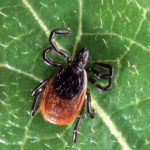Tips to Prevent Lyme Disease
 May is Lyme Disease Awareness Month. Lyme disease is an acute inflammatory disease caused by the bite of a tick infected with the bacteria, Borrelia burgdorferi. Lyme Disease Awareness Month is a campaign which promotes tips to prevent Lyme disease.
May is Lyme Disease Awareness Month. Lyme disease is an acute inflammatory disease caused by the bite of a tick infected with the bacteria, Borrelia burgdorferi. Lyme Disease Awareness Month is a campaign which promotes tips to prevent Lyme disease.
In the United States, the deer tick or western black-legged tick and lone star tick are known or suspected transmitters of Lyme disease (not the common brown dog tick that is so common indoors on dogs).
The deer tick spreads the disease in the north central and eastern parts of the United States. The western black legged tick spreads Lyme disease on the west (Pacific) coast. Both species of ticks are found in wooded areas. Only a very small percentage of deer tick bites in Florida spread Lyme disease.
Lyme disease is a multi-stage infectious disease that can be debilitating if left undiagnosed or untreated; and diagnosing the disease is difficult. The symptoms are often similar to other diseases and the diagnostic tests are not reliable. The circular, outward growing rash around the bite helps identify Lyme disease. However, about 15% of the cases are asymptomatic, meaning that these patients with Lyme never develop the symptoms.
Early symptoms may include:
- Headache
- Fever
- Fatigue
- Joint aches
- Stiff neck
- Bulls-eye rash, called erythema migrans, develops within three days to a couple of weeks after the bite in 60-80 percent of those infected.
Chronic, Late-Stage Manifestations of Lyme disease
- Without early treatment, Lyme disease can become chronic with potentially devastating consequences.
- Late-stage complications occur within months to years after infection.
- Disease can spread to several organs.
- Late-stage complications may include chronic joint disease which usually appears as arthritis, with pain and swelling in one or two joints, memory impairment, irritability, spinal pain and numbness, tingling in the hands and feet, eye complications such as inflammation of the main nerve to the eye and inner lining and occasionally heart abnormalities.
- Chronic infection may require extended treatment or hospitalization
People who spend time outdoors during the peak season, May through August, have a higher risk of exposure. Finding ticks crawling on one’s clothing or skin after a venture into the woods is quite common in most areas.
Massey Services Offers These Helpful Tips If You Spend Time Outdoors
- Clothe yourself protectively. Wear long-sleeved shirts; keep shirts tucked in; wear long pants and keep them tucked into socks.
- White or light clothing is recommended as it is easier to spot any ticks.
- Do not place soiled clothing on your bed or ticks may transfer to bedding.
- Use repellents per their label directions.
- Keep your property as clean as possible of leaf litter and tall grasses.
- Keep bird feeders away from the house and clean underneath.
- Check your pets regularly for ticks.
What Do You Do If A Tick Bites You?
- Remember, not all ticks carry Lyme disease.
- To remove a tick, grab it as close to the skin as possible with tweezers and gently pull outward.
- Do not grab the tick with your fingers, cover it with nail polish, or try to heat or smother it, or it can cause the tick to inject the bacteria.
- Carrying a tick removal kit is advised as they can be used to effectively remove ticks from the body reducing the risk of disease transmission. Often the disease is transmitted when a tick is not removed properly.
- The body breaks away with the head still buried in the skin; this causes the tick to regurgitate its contents into the person’s body.
- “Do It Yourself” tick kits should include an insect repellent, a pair of fine tweezers, an antiseptic and small vial.
- If the mouthparts remain in the skin, do not worry, the tick cannot pass the bacteria if only the mouthparts remain.
- In most cases, ticks must remain attached for 36 hours to pass the bacteria. Check yourself thoroughly, regularly and promptly to prevent infection.
If you have removed ticks from your body and start noticing the symptoms of the disease, see a doctor!